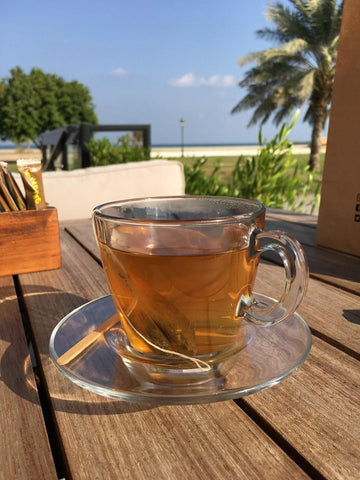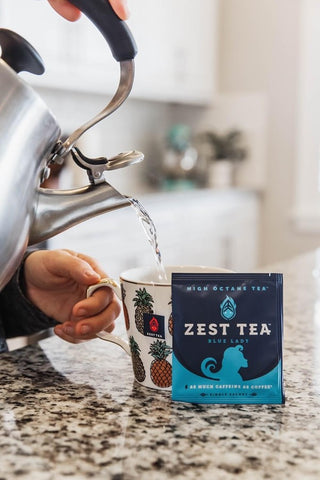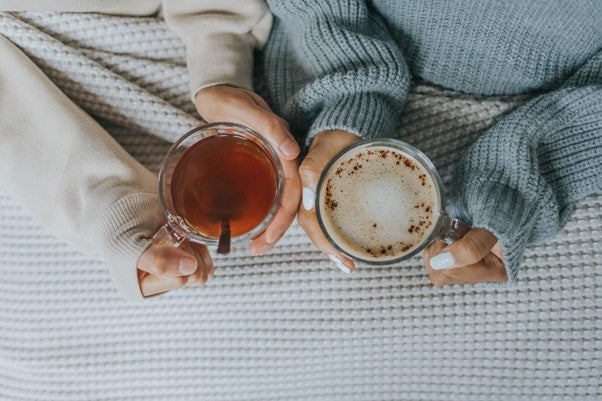Switching from Coffee to Tea - 5 Things You Should Know
Quitting coffee cold turkey is no easy task when you need that morning caffeine kick to get you going. But coffee comes with some undesirable side effects that may have motivated you to kick the habit entirely.
Switching to drinking tea daily is much easier than going cold turkey. It gives you a little of the caffeine you are accustomed to from drinking coffee, but without the unpleasant withdrawal symptoms and mid-afternoon crash.
But before you make the switch, here are a few things that coffee drinkers should know about switching up their prized French pressed coffee beans to loose leaf Energy Tea.
Why You Should Switch from Coffee to Tea
Drinking coffee provides a source of caffeine, so too much coffee results in a high caffeine intake. The excess energy you'll have from drinking too much coffee gives you those jitters and hyped-up vibes that are hard to control.
Coffee drinkers may also experience other symptoms. The acidity of coffee can irritate your stomach acid, worsening acid reflux and IBS. Your coffee habit may also lead to muscle cramps and short-term increases in blood pressure. If you usually drink your coffee with plenty of sugar and milk or cream, it's not particularly great for your cholesterol levels either.
And don't forget the caffeine withdrawal late in the afternoon when that first cup wears off. We don't blame you for wanting to break the constant cycle of needing to drink coffee for an energy boost.
1 - Drinking Coffee Made You Sleepy

This is the dark side of coffee's caffeine content. Drinking that first cup of the day provides a huge energy kick. It's more energy than you'd get from a cup of tea or from waking up slowly and naturally. But it doesn't last forever.
When the caffeine wears off suddenly, you're left feeling irritable and even more tired than before. This is because caffeine blocks adenosine receptors in your brain. By blocking these receptors we prevent those sluggish and sleepy feelings from taking effect. When the caffeine suddenly wears off, a rush of adenosine can now bind to those receptors, creating a sudden energy crash.
Therefore, caffeine locks you into a bad cycle. It provides energy, then takes it away so quickly that your only solution seems to be reaching for another cup. Tea, on the other hand, works in a slightly different manner.
Learn more about how caffeine works in our article Caffeine in Tea vs. Coffee.
2 - Caffeine Withdrawal Is a Problem

A cup of black coffee contains approximately 96mg of caffeine. Black tea, on the other hand, contains 47mg of caffeine. Suddenly dropping your caffeine intake in this manner may lead to some minor withdrawal problems.
Typically, you'll experience these symptoms 12-24 hours after giving up or reducing your caffeine intake.
Withdrawing from caffeine can cause:
- Headaches - long-lasting or short lived,
- Fatigue, low energy levels and inability to focus,
- Anxiety, especially if you are also reducing your sugar intake,
- Low mood, depression, and irritability,
- Tremors - particularly if you regularly consumed a vast amount of caffeine.
A good way to keep your caffeine intake comparable with coffee - but without the undesirable side effects - is to select a highly caffeinated tea like Zest Tea. Learn more about our tea range below.
3 - Tea Will Improve Your Focus

Tea is a source of caffeine, however unlike coffee, tea leaves are also a source of L-Theanine. This amino acid is what helps just a little caffeine boost your day so much better. All caffeinated teas (excluding herbal tea) are the perfect alternative to coffee as they contain both caffeine and L-Theanine.
L-Theanine has several beneficial effects:
- It enters the bloodstream and works alongside caffeine to provide sustained energy that comes on smoothly,
- This prolonged and sustained energy boost is gentler on your nerves and prevents the dreaded caffeine crash,
- L-Theanine can also stimulate mental alertness and attention during demanding cognitive tasks, particularly when combined with caffeine,
- The amino acid also has a calming effect and known anti-anxiety properties. When combined with GABA, it can also help you achieve better sleep quality and duration.
All tea types from the Camellia sinensis tea plant provide a source of L-Theanine, but the exact quantities depend on the cultivar of the plant and how it is processed. Both black tea and green tea types provide L-Theanine, so check out our high caffeine beverages.
4 - Drinking Tea Comes with Health Benefits

Both coffee and tea drinkers benefit from a great range of health-boosting properties. However, the benefits you get when you drink tea are not the same as those you'd get from caffeine.
- Boost your immune system - tea is a source of nutritional immunity. It contains a wide range of polyphenols, micro nutrients, and alkaloids that have anti-inflammatory and immunomodulatory properties.
- Tea can help prevent cancer - tea is a rich source of antioxidants, which bind and eradicate free radicals. Green tea in particular can also improve cell cycle regeneration, receptor tyrosine kinase pathway inhibition, and epigenetic modification control.
- Caffeinated tea is also associated with a lower risk of cardiovascular disease, diabetes, obesity and arthritis.
All tea, whether it's green tea, yerba mate or a caffeine-free tea can also help you to stay hydrated. As you can consume more cups of tea than coffee before you reach the recommended daily caffeine limit (400mg) you'll also consume more water.
5 - You Can Enjoy So Many New Flavors

Coffee tends to taste vaguely the same no matter how you prepare it. Whether you like it milky and sweet as a latte, or opt for single-origin coffee beans so you can taste the subtle nuances developed from a particular growing region. Any way you brew it, it still has that familiar coffee flavor.
Tea, on the other hand, is far more vibrant and varied in flavors. There are numerous ways to combine tea with other ingredients and prepare it differently too.
To start with, you have numerous caffeinated tea types to select from:
- Black - malty, rich and full of tannins.
- Green - sweet, light and grassy with vegetal notes.
- White - smooth, mellow and delicate.
- Oolong - ranges from lightly oxidized and grassy, to heavily oxidized and rich.
- Pu-Erh - earthy and unusual with very deep flavor notes.
Depending on the growing region, cultivar, and processing methods, each of these tea types had endless varieties when it comes to flavor.
Next up, you've got your preparation method to select from:
- Hot brew - comforting, simple and easy to do.
- Iced - just pour your hot tea over ice to instantly chill it.
- Cold brew - infuse the tea in cold water slowly, for a smoother and sweeter flavor.
- Matcha - whisk the tea leaf powder directly in water to create a very strong tea.
After that, your next choice comes down to additional flavors. Many tea blends contain a range of ingredients directly with the teabags. For example, bergamot is added to black tea to create an earl grey tea.
There are also ingredients you can add after the tea leaves have been infused and removed:
- Milk and sugar to create a classic black tea.
- Honey and lemon to create a soothing tea that's great for a cold.
- Lemon slices for a delicate afternoon tea type.
- Ginger and mixed spices to create a chai tea.
- Fresh fruit, to create a cocktail-like iced tea.
- Condensed milk to create a sweet Thai tea.
- A shot of espresso to create a dirty chai.
There really is a type of tea for every palate. With a little experimentation, you can easily find a tea that tastes better than your old favorite coffee. To help you get started, we have 6 different tea blends ranging from fruity green teas to lightly spiced black teas.
Zest Tea - More Caffeine Than Coffee

Most teas naturally contain less caffeine than coffee. Even the most caffeinated teas such as yerba mate and matcha struggle to match coffee for caffeine content.
At Zest Tea, we boost our tea caffeine levels to 120-150mg. This is more caffeine than coffee, so you can get that energy boost without the side effects. We do this by adding additional tea extract to our teas. It's an entirely plant-based way to power your day.
Furthermore, all our ingredients are non-GMO and vegan. If you select our pyramid tea sachets or loose leaf, they're entirely biodegradable too.
Forget the Jitters and Crash
Coffee consumption is associated with jitters due to the high caffeine content, so you might think that high caffeine Zest Tea will also result in an uncontrollable energy boost. But don't forget the L-Theanine. Our teas naturally contain this calming amino acid to ensure that your energy levels stay consistent, smooth and refined.
The Best Zest Teas for Coffee Drinkers
We have a range of black and green teas with high caffeine content, but for coffee-converts, we recommend our most intense black teas. One cup provides 150mg of caffeine.
Spicy Masala Chai

One of our richest loose teas is Spicy Masala Chai. It features a warming Flowery Orange Pekoe black tea with cardamom, ginger, cinnamon and cloves. If you're fond of a spiced latte in the fall, then Spicy Masala Chai is a good alternative.
Try Spicy Masala Chai.
Blue Lady

Blue Lady is a Zest fan favorite. The smooth black tea is the perfect base for light notes of orange, lemon and hibiscus. If you usually drink your coffee black, we highly recommend brewing a Blue Lady tea bag in the mornings instead.
Available in loose leaf and tea bag formats.
Zest Sparkling Teas

If tea bags aren't your style, or you usually prefer your coffee iced, then our sparkling energy teas may be more suitable. They provide just as much caffeine as our tea bags and loose leaf, but with added bubbles and zero to low sugar.
Discover Zest Sparkling Energy Tea
FAQs
What happens when you switch from coffee to tea?
Depending on the type of tea, you may experience minor withdrawal effects if you're consuming less caffeine. However, the L-Theanine component of tea should ensure that you no longer experience the jitters and crash associated with coffee. You might also discover other benefits, including improved mental alertness and overall mood.
Is it hard to switch from coffee to tea?
Regular coffee consumption provides a lot of energy in the form of caffeine, which can be hard to give up due to the withdrawal symptoms. Switching from coffee to tea is a little easier as tea provides a source of caffeine as well as L-Theanine and other beneficial nutrients.
Can you lose weight switching from coffee to tea?
Tea can be a tool to help you lose weight, however quitting coffee for tea doesn't automatically mean you'll drop pounds. Regularly consuming tea along with a healthy and balanced diet and exercise regime will help you lose weight more effectively.
Read our article Searching for The Best Tea for Energy and Weight Loss to learn more.
Is it better to drink tea instead of coffee?
Tea has numerous benefits over coffee, including providing a smoother and prolonged energy boost and some unique health benefits.
What happens when you drink tea?
Drinking tea made from the Camellia sinensis tea plant provides a boost of energy in the form of caffeine, plus calmness and focus from L-Theanine amino acids. You'll also consume a range of antioxidants and rehydrate your body.
Is green tea better than coffee?
Green tea contains a range of antioxidants, flavonoids and key nutrients that you won't find in a cup of coffee - and vice versa. We believe green tea to be one of the best low-caffeine drinks available!

Do coffee drinkers live longer?
There is some observational evidence that those who drink coffee live longer, but it's very difficult to prove cause and effect. There are many variables that impact how long you live.
How much caffeine is in coffee compared to tea?
Tea typically contains less caffeine than coffee, with 47mg in a standard cup of black tea and 96mg in a standard cup of coffee. There are exceptions, however, such as Zest's high caffeine tea at 150mg.
Is tea dehydrating?
No. Although tea and coffee contain caffeine which is a mild diuretic (causing the need to urinate), neither will cause you to expel more water than you've consumed.
What happens when you drink too much coffee?
Drinking large quantities of coffee can give you jitters and unfocused energy, due to the high caffeine levels. However, consuming too much coffee (or tea) rarely leads to serious side effects. You may feel mildly ill and experience symptoms such as headaches and nausea.
SOURCES
- https://www.healthline.com/nutrition/is-coffee-acidic#health-effects
- https://www.nmd-journal.com/article/S0960-8966(11)01310-1/fulltext
- https://pubmed.ncbi.nlm.nih.gov/21880846/
- https://www.healthline.com/nutrition/caffeine-withdrawal-symptoms#TOC_TITLE_HDR_9
- https://pubmed.ncbi.nlm.nih.gov/21040626/
- https://pubmed.ncbi.nlm.nih.gov/30707852/
- https://pubmed.ncbi.nlm.nih.gov/33193427/
- https://pubmed.ncbi.nlm.nih.gov/30205425/
- https://pubmed.ncbi.nlm.nih.gov/24915350/
- https://www.healthline.com/nutrition/how-coffee-makes-you-live-longer#longevity
- https://www.mayoclinic.org/healthy-lifestyle/nutrition-and-healthy-eating/in-depth/caffeine/art-20049372
- https://www.mayoclinic.org/healthy-lifestyle/nutrition-and-healthy-eating/expert-answers/caffeinated-drinks/faq-20057965

